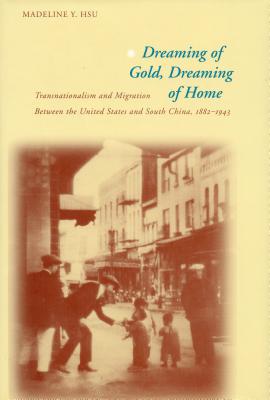

 Stanford University Press
Stanford University Press
Dreaming of Gold, Dreaming of Home: Transnationalism and Migration Between the United States and South China, 1882-1943


Key Metrics
- Madeline Y Hsu
- Stanford University Press
- Paperback
- 9780804746878
- 8.98 X 6.28 X 0.76 inches
- 0.97 pounds
- History > General
- English
 Secure Transaction
Secure TransactionBook Description
This book is a highly original study of transnationalism among immigrants from Taishan, a populous coastal county in south China from which, until 1965, the majority of Chinese in the United States originated. Drawing creatively on Chinese-language sources such as gazetteers, newspapers, and magazines, supplemented by fieldwork and interviews as well as recent scholarship in Chinese social history, the author presents a much richer depiction than we have had heretofore of the continuing ties between Taishanese remaining in China and their kinsmen seeking their fortune in Gold Mountain.
Long after the gold in California ran out and prejudice confined them to dismal Chinatowns, generations of Chinese--mostly men from rural areas of southern China--continued to migrate to the United States in hopes of bettering the family's lot by remitting much of the meager sums they earned as laundrymen, cooks, domestic workers, and Chinatown merchants.
Economic hardships and U.S. Exclusion laws extended the immigrants' separation from their families for decades, sojourns that in many cases ended only in death. Men lived as bachelors and their wives as widows, parents passed away, and children grew up without ever seeing their fathers' faces. Families and village communities had to adapt to survive the stress of long-term, long-distance separation from their primary wage-earners.
At the same time, men raised in the rural communities of a faltering imperial China had to negotiate encounters with an industrializing, Western-dominated, often hostile world. This history explores the resiliency and flexibility of rural Chinese, qualities that enabled them to preserve their families by living apart from them and to survive the intertwining of their rural world with global systems of race, labor, and capital. The author demonstrates that through migration to dank and narrow enclaves, they came to live, and even to flourish, in a transnational community that persisted despite decades of separation and an ocean's width of distance.
Author Bio
Madeline Y. Hsu is Professor of History at the University of Texas at Austin and served as Director of the Center for Asian American Studies eight years (2006-2014).
She was president of the Immigration and Ethnic History Society and is presently representative-at-large for the International Society for the Study of Chinese Overseas. She was born in Columbia, Missouri but grew up in Taiwan and Hong Kong between visits with her grandparents at their store in Altheimer, Arkansas.
She received her undergraduate degrees in History from Pomona College and PhD from Yale University. Her first book was Dreaming of Gold, Dreaming of Home: Transnationalism and Migration between the United States and South China, 1882-1943 (Stanford University Press, 2000).
Her most recent monograph, The Good Immigrants: How the Yellow Peril Became the Model Minority (Princeton University Press, 2015), received awards from the Society for Historians of American Foreign Relations, the Immigration and Ethnic History Society, the Asian Pacific American Librarians Association, and the Association for Asian American Studies.
Her third book, Asian American History: A Very Short Introduction was published by Oxford University Press in 2016 and the co-edited anthology, A Nation of Immigrants Reconsidered: U.S. Society in an Age of Restriction, 1924-1965 was published in 2019 by the University of Illinois Press.
Source: The University of Texas at Austin Department of History
Videos
No Videos
Community reviews
Write a ReviewNo Community reviews